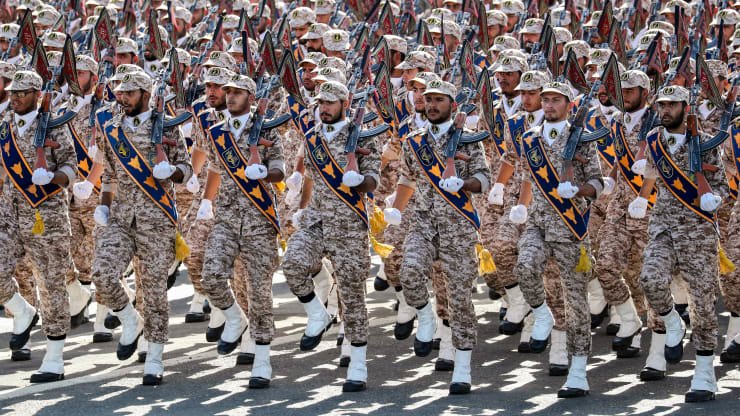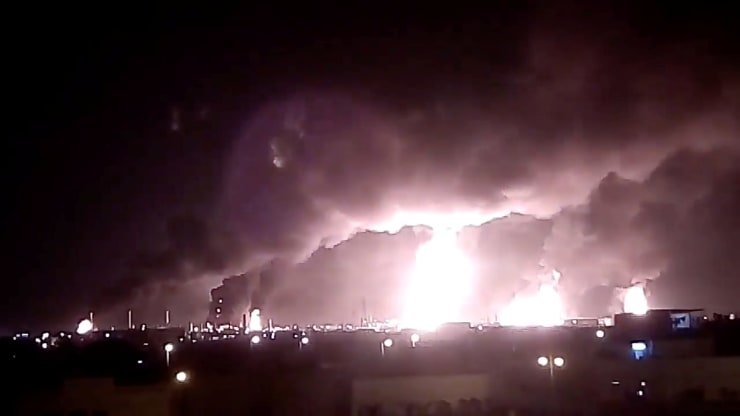
Iran celebrates 'momentous day' as UN arms embargo lifts. Here's what it means
Iran is now free to buy a range of previously restricted weapons, its government announced Sunday, hailing a “momentous day” as a 13-year-old U.N. arms embargo on the country was lifted as part of the 2015 Iran nuclear deal — and against vociferous opposition from Washington.
The government in Tehran insists that any weapons purchases would be “based on its defensive needs,” as allowed under the multilateral deal, from which the Trump administration withdrew in 2018.
“A momentous day for the international community, which — in defiance of malign US efforts—has protected UNSC Res. 2231 and JCPOA,” Iranian Foreign Minister Javad Zarif tweeted on Sunday, referring to the 2015 agreement.
The Foreign Ministry said in a statement Sunday that “as of today, the Islamic Republic of Iran may procure any necessary arms and equipment from any source without any legal restrictions and solely based on its defensive needs.”
Opponents of the embargo’s lifting don’t believe weapons buys will be solely defensive. They also take issue with another part of Iran’s newfound freedom: it can now “export defensive armaments based on its own policies,” in the words of Iran’s Foreign Ministry.
That could mean selling weapons to its proxies, analysts say, including militant and political group Hezbollah, designated by the U.S. as a terrorist organization.
“The legitimate concern when it comes to the lifting of the embargo is that Iran will be more capable of accessing weapons from states such as Russia and China, or selling weapons to non-state actors,” Aniseh Tabrizi, a senior research fellow at the Royal United Services Institute in London, told CNBC. “This is a concern that even countries that oppose the U.S. position have.”
Washington has already threatened to slap sanctions on any individual or entity supporting Iran’s weapons program.
What can Iran actually do now?
The embargo’s expiration allows Iran to buy major conventional weapons systems, including everything from battle tanks and large caliber artillery to combat aircraft and warships, and perhaps most importantly, missiles and missile launchers — the latter group already highly developed indigenously in Iran.
But there’s one major problem for Iran: It’s cash-strapped. Additionally, no number of jets or armored vehicles it can afford will enable it to match the conventional forces of its adversaries. And U.S. sanctions will likely again come into play to deter potential sellers.
But what Iran can now do is purchase new weapons parts to upgrade the systems it already has.
“While concerns that Tehran will become a conventional military power overnight are overblown, this is a critical juncture for the country to enhance lethality,” said Behnam Ben Taleblu, a senior fellow at the hawkish Foundation for Defense of Democracies in Washington, D.C. The FDD is highly critical of the 2015 nuclear deal, which gave Iran sanctions relief in exchange for curbs to its nuclear program.
Tehran has said it has no intention of going on a conventional arms buying spree — though it’s restricted by its sanctions-hobbled economy regardless.
Given its strained budget, Iran will likely pursue more selective modernization, Ben Taleblu said, “with a likely emphasis on homeland defense and long-range strike capability.”
‘Much more capable lethal and reproducible capacity’
Iran’s specialty is asymmetric warfare, honed under years of sanctions with the help of reverse engineering to replicate other countries’ missiles and smaller arms — and in some cases, make them better.
Kirsten Fontenrose, director of the Scowcroft Middle East Security Initiative at the Atlantic Council, predicts this capability will only get stronger.
“What we’re worried about is not so much the drones themselves, but the pieces on them, so things like higher-quality engines for the units and optical lenses to improve targeting,” she said during a webinar hosted by Washington-based think tank AGSIW.

“What Iran has shown is that even if they buy a small number of weapons, within 20 years they will produce a variant of that which in some instances is even better than what they bought,” Dave DesRoches, an associate professor and senior military fellow at the National Defense University in Washington, D.C., said during the same webinar.
“So as they make incremental improvements, as they reverse engineer new technologies, integrate new imported motors, they’re getting much more quickly operational, lethal and reproducible capability.”
Initial purchases for Iran might be solid fuel rocket motors, guidance systems, optical jammers that could counter drones or anti-tank missiles, and small arms like upgraded anti-tank guided missiles, DesRoches said, with China and former Soviet states as key sellers.

There may even be some aircraft purchases from Russia as a symbolic move, and Tehran is also likely to pursue Russia’s S-400 missile defense system, as an upgrade to the S-300 system it already has.
“But this idea that they’re going to build an air force that can counter the Saudi Air Force in the air I think is misguided,” DesRoches said.
Still, drone and missile attacks are a serious threat to Iran’s arch-rival Saudi Arabia, as demonstrated during the September 2019 Abqaiq and Khurais attacks. Now that Iran has easier means of delivering weapons to its proxies, the Iranian-backed Houthi rebels fighting the Saudis in Yemen will likely enjoy the benefits of some of those potential upgrades.
Why did the Security Council let the embargo lift?
The U.S. was overwhelmingly defeated by other U.N. Security Council members when it attempted to extend the arms embargo in August. It subsequently declared a “snapback” of nearly all U.N. sanctions on Iran last month against the opposition of the 2015 deal’s European, Russian and Chinese signatories, who called the move void. Pompeo called the failure to extend the embargo “inexcusable.”
But for the vast majority of the Security Council, lifting the embargo is crucial to the Iranian nuclear deal’s survival, says RUSI’s Tabrizi.
“It was part of the (2015 Iran nuclear) agreement since the beginning, and not meeting their obligations would mean that the agreement collapses,” Tabrizi told CNBC. “So there is a risk that Iran comes out of the agreement completely.”
That would likely mean “more drastic measures” on the nuclear front, Tabrizi said. “They basically don’t want to give an alibi to Iran to take more drastic measures on the nuclear realm.”











